Monday Feb 16, 2026
Monday Feb 16, 2026
Tuesday, 3 March 2020 00:00 - - {{hitsCtrl.values.hits}}
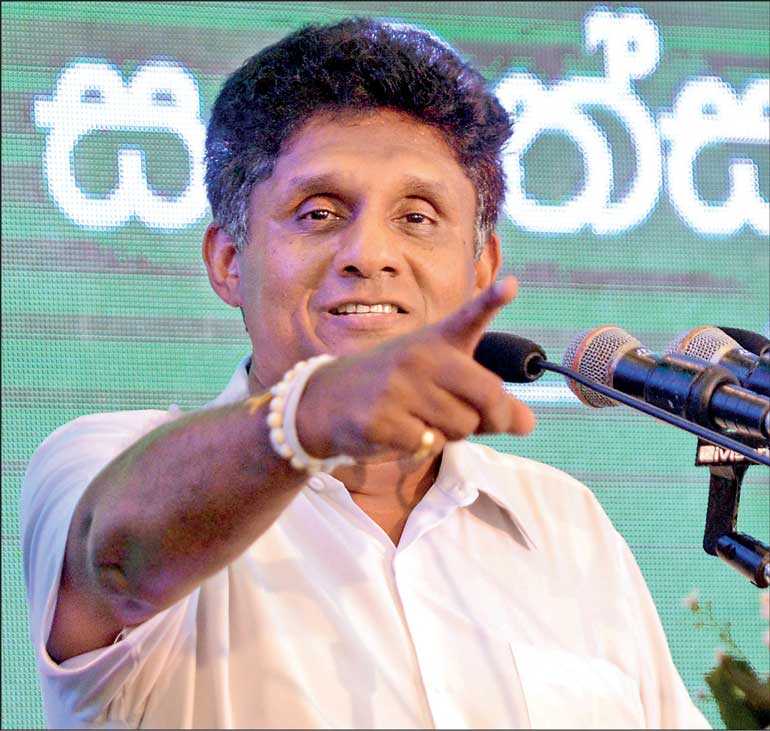
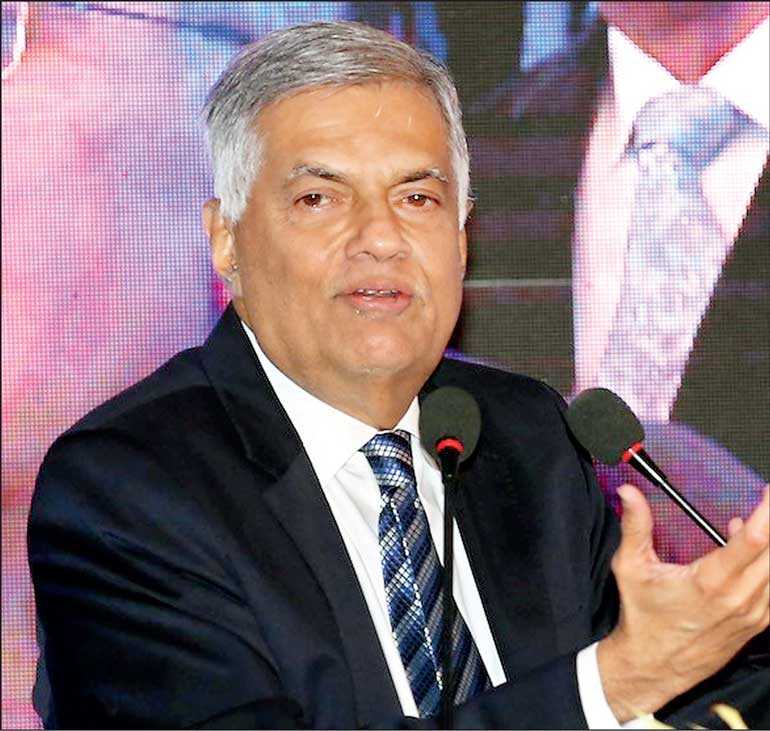
The supporters of Sajith Premadasa seem to attribute his defeat at the Presidential Election to Ranil Wickremesinghe and the UNP group supporting him. It is publicly implied that Ranil Wickremesinghe  delayed the process of naming Sajith Premadasa deliberately as the presidential candidate of the UNP, with the intension of sabotaging the campaign by not giving them sufficient time to organise it.
delayed the process of naming Sajith Premadasa deliberately as the presidential candidate of the UNP, with the intension of sabotaging the campaign by not giving them sufficient time to organise it.
After the election, they held media conferences and accused the Sirikotha faction of the UNP of withholding funds and forcing the campaign managers to downsize the campaign. Some seem to think that Ranil’s reply to the media that he will be the PM in the event the UNP wins the Presidential Election was an act of sabotage. The fact remains that Ranil was the Prime Minister at the time and in the event of Sajith becoming the President he still remains as PM until the General Election. Even after winning the General Elections, Ranil would continue to be PM as long as he is the Leader of the Party.
The analysis of the causes of Sajith’s defeat does not hold water if one looks at things rationally. A more realistic analysis not driven by hatred and self-interest, could be more useful for Sajith’s political future and help the UNP to plan a more effective campaign to win the General Election.
Were there fundamental weaknesses in Sajith’s campaign?
Many disagree with the analysis of Sajith’s supporters regarding the reasons for his defeat. Some see it as an attempt by his supporters to cover up their failure. Some feel that Sajith was misled by some of his over-enthusiastic supporters who misread the political picture and who hated Ranil for various reasons and had their own agenda. Whether this is true or not, it is the difference between the UNP campaign and the SLPP campaign that finally mattered.
Were there fundamental weaknesses in Sajith’s campaign?
The Sajith faction began their campaign by confusing the minds of the UNP supporters as well as voters with no firm commitment to any party, by publicising their dispute with the party leadership instead of resolving matters within the party and coming forward as a united and a decisive force. Their strategy of distancing themselves from Sirikotha, backfired on them as these moves eroded the voters’ confidence in the UNP as a strong party that could lead the country out of its mess. The appointment of a person who had been charged in a court of law for forgery as the campaign manager and running the campaign from two places weakened the structure of Sajith’s campaign.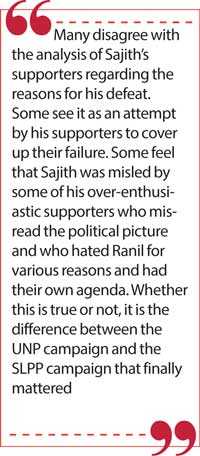
Even before a decision had been taken regarding the candidature, some Sajith supporters, including Sajith himself, referred to deal makers within the party and announced that they do not want to go forward with the deal makers. Did this imply that Ranil and his supporters made deals with the
Opposition and the foreign powers?
Deals which were harmful to the country and prevented the prosecution of the Rajapaksas? Sajith may have thought that distancing himself from the party leadership might protect him from all criticisms levelled at the UNP by the Opposition.
Didn’t such rhetoric confirm the doubts already in the minds of the public that UNP collaborated with the thieves and deliberately avoided bringing the thieves before the law? This also lent support to the Opposition’s accusation that the UNP is selling the country by entering into agreements with foreign powers which were harmful to national interest. Didn’t they realise that they were doing this when the country was reeling with the fear of such agreements?
Misunderstanding among the people
People did not identify Sajith’s group as an alternative to the UNP since Sajith was contesting on the UNP ticket. Hence, these unwise statements damaged the electoral prospects of the party. People were tired of corruption and thieves having a free run to rob the country, and they became disillusioned with the UNP for not bringing them before the law. These accusations were missiles the Opposition was going to use not against Ranil Wickremesinghe, but the UNP to woo the voters who are guided not by the head, but by the emotions when they decide to vote.
The fact that SOFA agreement had been signed before by the Opposition without even Cabinet approval was not used by the UNP to reverse the impact of the allegations against them and make a case against the Opposition to expose their double standards. The UNP does not seem to believe that a passing reference to it by one or two does not reach the average voter. Repeated attempts to squash criticism on different platforms by a number of people, the force of delivery of such arguments, and the choice of words go a long way in convincing the voters.
Sajith’s frequent reference to UNP deal-makers and his painful attempt to distance himself from them raised another logical question in the minds of the intelligent voters. Sajith was an important member of the party. He was the Deputy Leader and a Cabinet Minister. Why didn’t he rise against what he called ‘the deal-making’, if it was true? On the other hand, could it be the truth that Ranil had no crooked deals with the Rajapaksas, or interfered with the judiciary, but the thieves had not left any clues and they had faithful supporters in the public service, particularly among those that investigated the crimes, to sabotage the investigations, making it extremely difficult to proceed with the cases? These were the people who had benefited from them financially and otherwise. 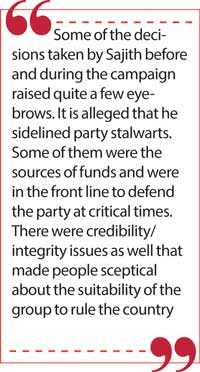
Ranil may have acted within the law to accommodate and give due place to the Rajapaksas for ethical reasons and for the fact that Mahinda Rajapaksa was the President who had won the war against the terrorists.
All this meant Sajith did not fit the role of the hero who rose against corruption in the eyes of the voters.
Questionable decisions
Some of the decisions taken by Sajith before and during the campaign raised quite a few eyebrows. It is alleged that he sidelined party stalwarts. Some of them were the sources of funds and were in the front line to defend the party at critical times. There were credibility/integrity issues as well that made people sceptical about the suitability of the group to rule the country.
Some of the supporters who were leading the move to confront the party leadership to wrench the candidature, were the very people who were introduced into politics by Ranil Wickremesinghe and who received Ministerial posts within a short time with his blessings. It was not unusual for the voter to mull the question whether they could do the same thing to Sajith. The strategy Sajith followed to wrest the candidature, ruled out diplomacy and constitutional procedures, excluded reason, honourable negotiation, but emphasised intimidation and lack of ethics.
It aimed to put the Leader and the Executive Committee in a straightjacket. Is it realistic to expect the candidature served on a platter under such circumstances? He decided to name his future ministers from the campaign stage. By doing that he showed that either he is capable of violating the constitution like Sirisena or he is ignorant of the procedures of appointing Ministers.
Do people want another Sirisena? This and sometimes his choice of words did not result in what he probably expected, instead unwittingly projected his image as an egotistic leader. He focused too much on playing the role of ‘God father to the poor’ and threw free handouts left, right and centre, without realising that free handouts can make the poor happy, but not those who work, for they are a burden to the Tax payer and not a sustainable development approach. The Opposition too offered free handouts, but tried to strike a balance by offering tax reductions though not plausible after the elections.
Sajith liberally signed MOUs with different groups which didn’t mean a thing to the floating vote. This made his campaign manifesto and empty statement without substance in the eyes of some. The undue publicity given to Sajith and the spiteful attacks made against Ranil by a media house has in a way worked against Sajith.
Shortcomings of the UNP
The UNP did not direct its radar towards the opponent to identify the mechanics of the Opposition campaign strategy except the speeches on campaign stage and repeated the same arguments against them. Had it identified the methods that the Opposition could use to grab the voters’ emotions to win votes, it could have made some counter moves. The Opposition worked over three years on many fronts to plan and prepare the ground for the battle.
For years Sajith confined himself to the housing sector and helping Buddhist temples to build his image among the poor and the Sangha. He did not touch the middle and the upper middle class by being a vociferous speaker about national issues and issues faced by the party or to dismantle criticism levelled against the party leader. It is the floating voter who tips the balance at elections and not the poor people. Of course this can change if the emotional southern Sinhala Buddhists are upset over something which could make them stand up to protect the race (jathiya) and Buddhism (aagama). Now the latest to drum up emotions is ‘Ranaviru Pavadeema’ and ‘videsha kumanthrana’.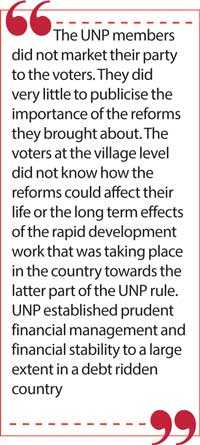
Though it is alleged that Sajith was not given enough time to prepare the campaign, he had plenty of time to prepare the ground work necessary for a UNP victory. In a situation where the party system prevails, elections cannot be won only by building individual images. The foundation for the victory is the strong image of the party and its acceptance by the people. Had he and his supporters made a greater effort to checkmate the Opposition by wisely tackling the two issues faced by the UNP namely, the bond issue and the 21 April issue, they could have shifted the blame for both at least partially to the Opposition.
The UNP’s inability to fortify itself against public criticism
It was during the time of Opposition that the establishment of the Batticaloa University was facilitated when Dulles Alahapperuma signed an MOU with Hizbullah and released Mahaweli land for the campus. It was during their Government that rules and exchange control regulations were bypassed to get millions of Arab money to build it. The UNP failed to use the material available to fortify itself and direct public criticism towards the Opposition. None was courageous enough to speak against the accusations made by the Opposition against the UNP regarding the bond scam at the initial stage, although there was time to do that before the legal investigations started.
Not even an effort was made to create some doubt among the public that the real culprits might be found somewhere else and not within the UNP Government and that this could have happened even before Ranil came into power. It is known that bonds were sold whenever the treasury wanted money. They were sold at private auctions during Cabraal’s tenure as Governor. Such private auctions too leave room for irregularities to take place.
UNP MPs kept mum while the SLPP had a field day blowing it up to the extent of making it look like the biggest robbery in the century. Since Sajith’s group had the where withal to know about deal makers in the UNP they could have easily collected information about bond issues as well. In contrast to the UNP response to the charges levelled at them, consider the collective effort of the SLPP members to extricate Cabraal and the SLPP from the bond scam. Both inside and outside parliament they try to make people think that the forensic audit of the Bond auction is a doubtful document executed in a partial manner. They even allege that two internationally accepted auditing firms whose business prospects depend on their integrity, have prepared a biased audit. It is said that when you repeat a lie for some time it becomes the truth. Whether it is right or wrong, the SLPP has already created a doubt in the minds of their ignorant supporters regarding the accusations against Cabraal. They know the value of standing together.
Insubstantial information for the public to make distinctions
The UNP members did not market their party to the voters. They did very little to publicise the importance of the reforms they brought about. The voters at the village level did not know how the reforms could affect their life or the long term effects of the rapid development work that was taking place in the country towards the latter part of the UNP rule. UNP established prudent financial management and financial stability to a large extent in a debt ridden country.
While the SLPP used every means to zero the achievements of the UNP Government, the UNP members were divided and looked after their personal interests without demolishing the empty arguments of the Opposition. Had the UNP members at least collected the telephone numbers of a few people in the electorate and made them the focal points to reach the individual voter, or established links with the village priest to at least neutralise the misinformation the Opposition was spreading at the village level, things could have been different. UNP MPs acted like the ‘andi hath dena ‘. They do not seem to have realised that what matters most in elections is what is fed into the emotional part of the minds of the voters during the weeks just before the elections.
Replacing the leadership
How foolish it was to rush things when there was the opportunity to replace the leader in another three years in a constitutional way after the tenure of the present leader. Sajith is still young enough to wait and he would have benefited from the experience and wisdom of Ranil had he worked more closely with him. To elaborate the point, when complimenting Sajith on stage, Ranil suggested that in view of the limited land mass we should think of multi-storeyed housing even in village areas.
On the other hand Gotabaya Rajapaksa and his brothers were busy for well over three years preparing their multi-pronged strategy to organise a winning campaign.
Gotabaya mobilised the educated and the professionals to prepare policy and prepare a social media campaign against the UNP while his brothers with their political organisation mobilised the Sangha, and other pro Sinhala-Buddhist groups to reach the voters using whatever means available to appeal to the emotions of the Sinhala Buddhists.
Months before the election they collected data about the voters which enabled them to establish communication links directly with the voters. Gotabaya ran a well- organised and a well-focused campaign and won. The writer is not trying to hold a brief for Ranil Wickremesinghe. This is an effort to make a realistic and a fare analysis. Let us examine whether the above mentioned allegations against the leader have any substance or whether it is a case of ignoring the realities on the ground.
Ranil, his weaknesses and strengths
As a senior public servant for over three decades and who worked mostly in the Finance and Planning Ministry which interacted with all other Ministries, I am familiar with the political career of Ranil Wickremesinghe from 1970 onwards. Ranil was not considered in the public service as a politician who made crooked deals or interfered with the public service and he was known as an honest and decent gentleman, but a little arrogant and aloof. Even though I had very little personal contact with him, in my view, from all that I have observed and heard during my carrier and later after retirement, he is one of the few gentleman politicians we have in Sri Lanka.
As a leader he has weaknesses as well as strengths like all others. But his strengths are outstanding while his weaknesses, particularly his inability at times to be decisive where it is necessary to be decisive and not wait till time resolve issues, his inability to come down to the level of the common man in a friendlier manner, and his failure to follow Buddha’s advice implied in the words ‘I do not believe, neither do I disbelieve’ have worked against him and his party. His failure to make the impatient younger politicians feel important by giving them an ear and responsibilities or purge them from the party when they exceeded the limits imposed by the party constitution, has brought him a lot of trouble and indignities.
His failure to make independent inquiries to make sure that inside information about bond auctions could not leak without relying on the words of another brought disrepute to himself and discomfort to the party while a bigger fraud had taken place before his time and whoever was/were involved in setting up a network to leak inside information and engage in fraud went scot free. Although the UNP government did recoup the loss by freezing the assets of a culprit, this went largely unseen by the public. The party members did not use that fact to reject accusations that their government was a party to the theft or caused a loss and say it was a mistake.
Sometimes, his straightforwardness and abrupt ways, have offended people and fanned hatred towards him among people who failed to get favours done by him or become cabinet Ministers within a short time. He has shown a tendency to help his peers, irrespective of whether they are with him or in the Opposition camps as long as it is within the law. He forgives his party men who have insulted him and damaged his image. This has been a drawback at times. Given all these negative attributes, is it fair to accuse him as the villain who prevented Sajith from becoming the President.
Anyone who has followed both Sajith’s and Ranil’s political careers and studied the elections in the past, would not agree that Ranil caused Sajith’s defeat, and that Ranil has lost all the elections in the past 25 years. No one openly appreciates Ranil’s statesman like qualities such as honesty, not taking revenge, not engaging in vituperative politics, or intimidation and mud- slinging at others or abusing his power by patronising his kith and kin. After the demise of the senior Premadasa, Ranil could have grabbed power. Instead he made D.B. Wijetunge the President.
His loyalty to the UNP members who helped him to maintain and safeguard the party during lean times when the UNP could not even meet the party expenses, is not understood by many. These UNP stalwarts who brought in the money may have had their private businesses, but in the interest of the party, they need to be given recognition for what they have done for the party.
Fathers’ commitment to the party
Gamini Disanayake, father of Navin Dissanayake, has done a lasting service to the party and the nation by implementing the Mahaweli hydro power and agricultural project. He lost his life in serving the party. Similarly Ranasinghe Premadasa too served the poor through his projects like the Garment factories, Janasaviya and the housing project. He too lost his life in a similar manner. Both Sajith and Navin have suffered equally as a result of their fathers’ commitment to the party. The party leader cannot prefer one over the other. He can make a distinction between the two only on the basis of their performance to strengthen the party and the leadership qualities they have displayed as well as their trustworthiness.
In promoting one over the other the leader is faced with a difficult decision and that decision has to be made after considering all aspects including the unity within the party and the response of the electorate and in keeping with the party constitution. The intimidating manner in which Sajith faction obtained the candidature and the way the campaign was conducted, it was obvious that the Party leader and the party constitution was challenged and ignored. Under such circumstances it is foolish to expect the Sirikotha faction and the leader to bend backwards and help. Had Sajith’s supporters not antagonised the leader and the party stalwarts in the executive committee even before the beginning of the campaign, there would have been better cooperation within the UNP.
Is Ranil a leader who has lost every election for the last 25 years?
Ranil won the election in 2001. The UNP won all the districts except one. However he was ousted by Chandrika who resorted to unconstitutional methods. In 2005 Ranil lost the election due to Prabhakaran who expected that he would be able to strike a political deal with Rajapaksa who was keen to take the Northern vote away from Ranil. Prabhakaran prevented all northerners from voting expecting reciprocity. That was the reason for the UNP defeat and not the inability of Ranil.
In 2010 nobody in Sri Lanka could have defeated Mahinda Rajapaksa, the man who brought relief to the country by defeating the LTTE after 30 years. One cannot blame Ranil for that defeat. It is therefore unfair to say Ranil lost all the elections during the past 25 years. Normally local elections follow the trend shown in national elections. It must be said that victory and defeat at these elections also depend on the individual performance of the members of these authorities and whether they served the people or served themselves with the money available to the authority.
All leaders operate with a few trustworthy people around them.
Mahinda Rajapaksa had his brothers around him who gave him unstinted support and that is one reason he won the war. Other Presidents failed to end the war even though they were committed to doing it as the war was a business for the corrupt. Ranil too had a few people whom he considered as trust worthy and efficient. A trust worthy group is vital particularly in a situation where you head a minority government and there are two opponents, the Opposition and an unfriendly President. The situation becomes worse when there is a President intriguing to divide your party and an Opposition waiting to grab your MPs by bribing.
Ranil had to rely on a trusted and efficient group to protect the party and at least show economic results. The existence of such a group or the so called ‘Gaja Mithuru Kalliya’ does not necessarily mean that Ranil undercut everybody else in the party.
His fault may have been that he depended too heavily on this inner circle to the extent of excluding the participation of promising young leaders in the decision making process. Perhaps the need of the hour, the precarious political circumstances and the need for rapid development before the elections if the UNP is not to be routed at the next election, may have prompted such an approach. However as a leader he failed to realise that a mere state minister’s post or Deputy minister’s post without allocating specific functions and power legally, would not meet the aspirations of a young and budding politician, for the Minister concerned has all the powers and functions allotted to him legally.
So why blame Ranil for the frustration?
So why blame Ranil for the frustration? Politicians love power and in Sri Lanka, except a few, they want more and more of it. That is why we call them politicians. Otherwise they will be called statesmen at some point. Some politicians say they are more eligible to lead because they are mature and experienced. Others say they are more eligible as they are young and the value of experience is zeroed by them. There is no age limit for politicians. Take Mandela, or Mahathir Mohamed of Malaysia who led the country during their eighties.
Both sides, the young and the old, don’t seem to understand that they have to prove their ability to build the party and the country by action and not by publicity and intrigue to reach their goal.
Most of the criticisms and insults levelled at Ranil seemed unreasonable and he remains unscathed. He is still Mr. Clean in the eyes of many.
However it must be acknowledged that through thick and thin, Ranil preserved the party. To use offensive language and intimidation to drive away a leader like that to take over the party lock stock and barrel, is a bit uncivilised and unethical to people who value ethics and civility. I guess this is more so in a society where the social values are based on Buddhism. Sri Lankans in general prefer ethics and fair play. This is why when a feeble person is intimidated on the wayside, many would take the side of the victim. It would have been wiser and better for both sides had the differences been ironed out without intimidation, high and mighty attitudes, with good will and farsightedness.
The undecided voters
The voters who pick the winner at the election belong to the group of voters called the floating vote. This remains valid unless someone can do something to convince the Sinhala Buddhists in the south that the Sinhala race and Buddhism will be wiped out from the surface of this earth or the war heroes would be exposed to danger unless a particular party is defeated. The voters falling into this category named the ‘floating vote’ are politically more aware and mostly educated.
By and large these voters still prefer ethical leaders and they respect our core values. They wait for the formula to wipe out corruption, bring in security, reasonable livelihood and protection for Buddhism. Sri Lankans in general still stand for the right thing. This was clearly demonstrated by the favourable public reaction to the brave stand taken by the lady forest officer in Negombo who tried to enforce the law.